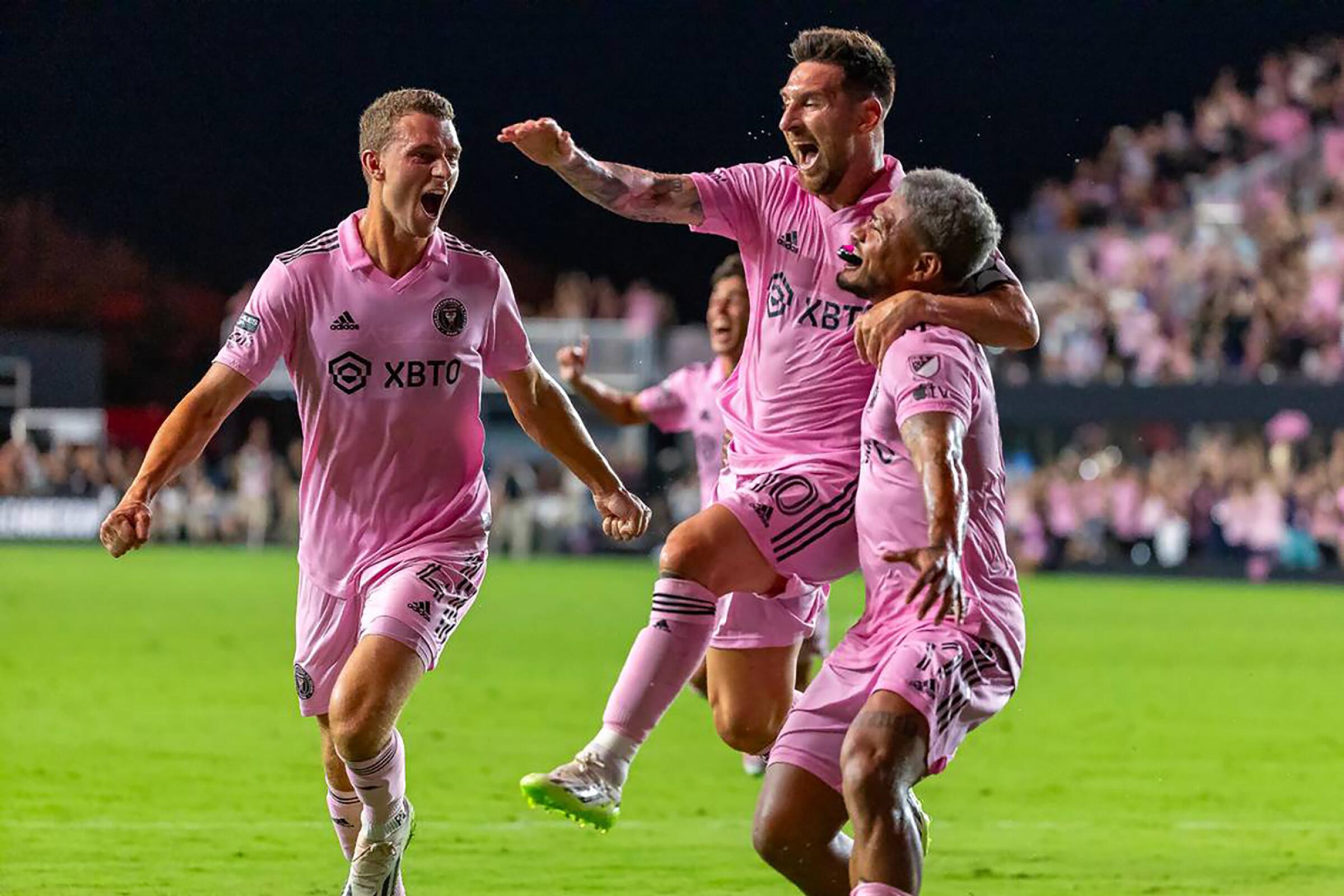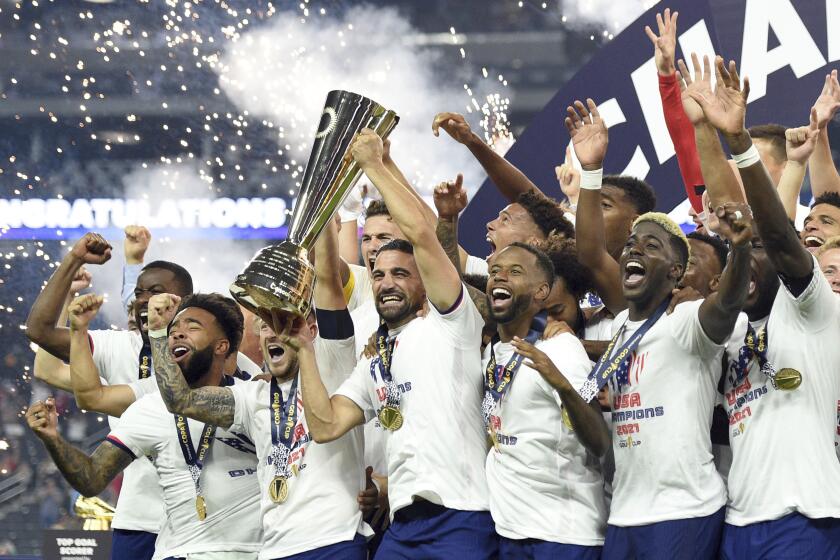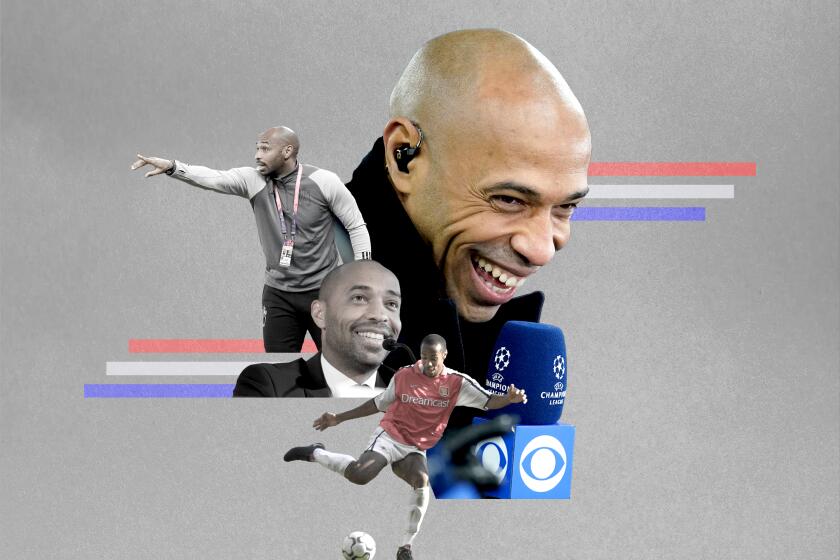Kevin Baxter writes about soccer and hockey for the Los Angeles Times. He has covered seven World Cups, five Olympic Games, six World Series and a Super Bowl and has contributed to three Pulitzer Prize-winning series at The Times and Miami Herald. An essay he wrote in fifth grade was voted best in the class. He has a cool dog.
- Share via
1
AUCKLAND, New Zealand — The first Leagues Cup will forever be remembered for Lionel Messi’s MLS debut, which ended with Inter Miami’s new captain drilling a stoppage-time free kick just under the crossbar to give his team a 2-1 win over Cruz Azul.
And that’s likely all it will be remembered for.
The month-long tournament, featuring all 18 Liga MX teams and all 29 MLS clubs, is the competition nobody needed and very few wanted.
It comes in the sweltering summer dog days of the most crowded MLS season in history, a time when many teams are already battered by fatigue, injuries and a crowded schedule. It’s fighting for attention with the women’s World Cup and for disposable income with barnstorming European and South American clubs, who will play nearly three dozen games across the U.S. during the next two weeks.
And with the exception of Messimania, it’s losing both those fights.
While the U.S. team’s World Cup opener was watched by 6.3 million TV viewers and a pair of friendlies involving European clubs drew crowds of 82,262 in East Rutherford, N.J., and 70,181 at the Rose Bowl, only one Leagues Cup game topped the MLS regular-season average of 21,913 on the tournament’s opening weekend. Three games had announced crowds of less than 11,000.
As for viewership, Apple TV won’t release its numbers, so we’re sure they’re just fabulous, but last moth World Soccer Talk reported four major Mexican broadcasters — Televisa, TV Azteca, Fox Sports and Claro — all declined to carry the tournament, citing a lack of interest.
So why are we even doing this?
For starters the World Cup-style tournament provides additional content for Apple TV, which is in the first season of a 10-year, $2.5-billion deal to stream MLS games. It also strengthens ties between MLS and Liga MX heading toward the 2026 World Cup, which Mexico and the U.S will co-host with Canada.
But mostly, it’s another attempt by MLS to win over Mexico’s passionate soccer fans — at least those in the U.S., who regularly reward Univision’s Liga MX coverage with ratings that dwarf the numbers the U.S.-based league gets. And the U.S.-Mexico rivalry has long inflamed those passions.
“We created this partnership because we believe the alignment of the two leagues, which is an extension of the competition that has taken place between our national teams, could create a level of awareness and excitement that will break through all the clutter,” MLS commissioner Don Garber said. “That’s kind of the point.”
CONCACAF Champions League, Nations League and Gold Cup tournaments have created congested schedules and hardships for MLS players and teams.
In reality, however, it only adds to the clutter. The two leagues’ top teams already meet in the CONCACAF Champions League, where four of the last six finals have matched MLS and Liga MX teams, and in the one-game Campeones Cup between the two leagues’ respective champions. Why do we need a third competition, especially since it’s likely to end with some of the same teams facing off again?
For the casual fan — another demographic MLS also needs to capture — all of this is confusing.
As for the U.S.-Mexico rivalry, the national teams meet so often now — they’ve played one another twice in the past four months and six times in the past two years — the games are in danger of losing their luster. Adding Leagues Cup to the mix could accelerate that decline. It will undoubtedly impact the MLS regular season.
Take the Philadelphia Union, for example. Because it made a long run in the Champions League this spring, its Leagues Cup opener was the team’s 31st game of the season. If it reaches the tournament semifinals, it will play six more times before returning to MLS play, where it has 11 regular-season games remaining.
If it makes the expanded MLS playoffs, that could add seven games, giving the Union a 2023 total of 55 games in 41 weeks.
In 2019, the final season before COVID-19, the Union made the playoffs and played just 37 times in 38 weeks.
And what happens if a team is eliminated in the first round of the tournament? The Galaxy’s final group-stage game is July 29 and their next MLS game is Aug. 20. If they don’t advance in the tournament, they’ll have a three-week pause in the middle of the summer, which isn’t ideal either.
“When you don’t play for three weeks, that can be a challenge,” said Seattle Sounders coach Brian Schmetzer. “You get rhythm through playing games.”
Philadelphia could enter the final stretch of the MLS season overworked and the Galaxy could enter it underworked. Neither option is good if, in fact, the MLS Cup is the real prize. Neither of those things are of much concern for the Liga MX teams, who were just three games into the 17-game Apertura schedule when play was suspended for the Leagues Cup. The Liga MX regular season will resume Aug. 18.
Still, Leagues Cup is a competitive tournament with a prize at the end so LAFC’s Carlos Vela, the captain of another MLS team sagging under the weight of a crowded schedule, says teams have to take it seriously.
“When you play a new tournament, you’re going to be the first champion ever,” he said. “So it’s something that we use as a motivation. Every time we have the chance to win trophy, we will do our best to get it.”
“Our job is to make a good game for the fans,” he continued. “We have to help this league be a good league. I think it’s part of our job.”
Motivation aside, if Leagues Cup is to become a permanent part of the MLS season and not just a passing fancy, like the All-Star Game partnership with Liga LX that lasted all of two years, roster rules will have to be overhauled to give coaches a team deep enough to play two games a week for 10 months. That will likely mean increasing the salary cap and adding more allocation money and/or additional designated players so teams aren’t forced to rely on just a small core of players. Otherwise, teams will arrive at the most important part of the season, the playoffs, fatigued or with injuries — or both.
Thierry Henry struggled to translate his killer instinct as a player into the right coaching tone. He’s ready for another shot, but will anyone call?
Poor play, which will hardly help TV ratings, would be a likely result.
Garber and Mikel Arriola, president of Liga MX, have a lot riding on this tournament. That’s why Messi’s MLS debut was timed not to help last-place Inter Miami claw its way to a playoff berth, but to gin up attention for the start of Leagues Cup.
Yet if Messi’s debut is all the tournament is remembered for, then it will all have been a waste.
⚽ You have read the latest installment of On Soccer with Kevin Baxter. The weekly column takes you behind the scenes and shines a spotlight on unique stories. Listen to Baxter on this week’s episode of the Corner of the Galaxy podcast.










